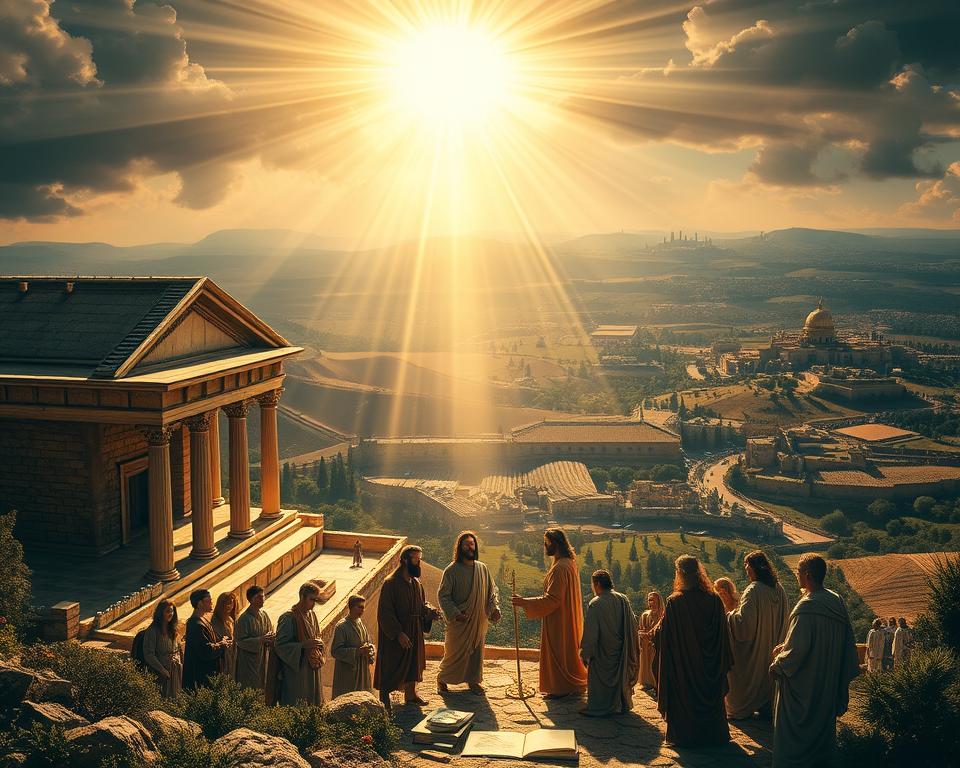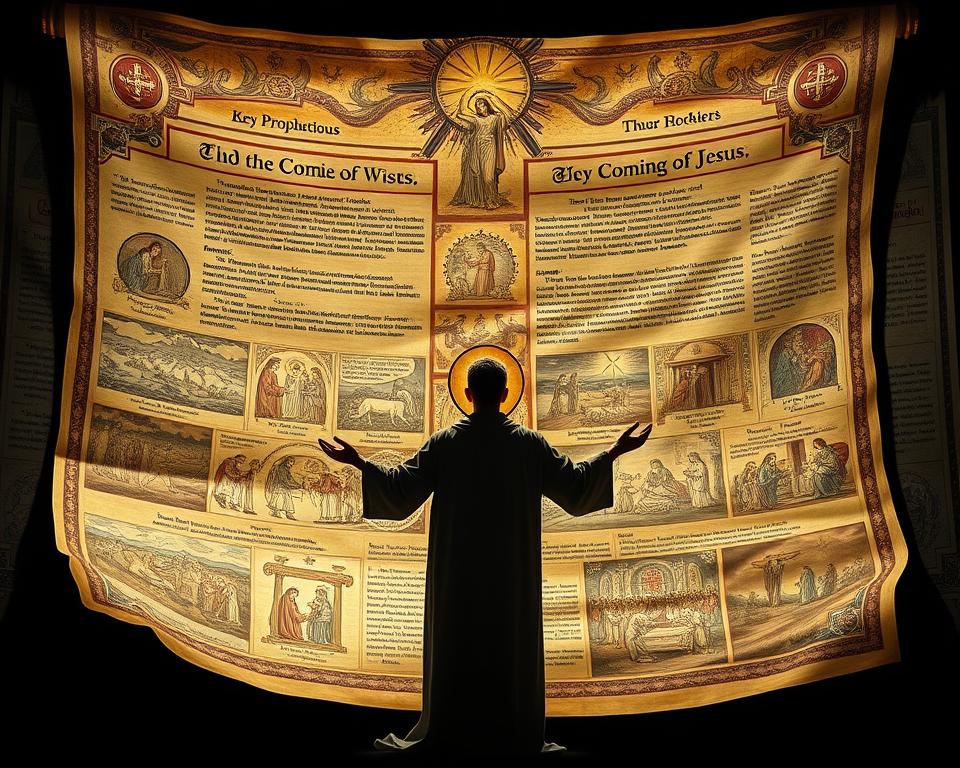Have you ever wondered how ancient warnings apply to your life today? Jeremiah’s messages of judgment reveal God’s heart—a mix of justice and relentless love. Though written centuries ago, this book challenges us to confront sin while clinging to hope.
With 52 chapters, Jeremiah’s book is the longest in the Bible. It doesn’t shy away from hard truths. Yet, every warning points back to God’s desire for restoration. His words aren’t just about consequences; they’re an invitation to return.
In this article, you’ll discover how Jeremiah’s struggles mirror our own. His tears, doubts, and faith remind us that divine love never fails—even in judgment. Let’s explore how these timeless lessons can strengthen your walk with God.
Who Was Jeremiah and Why His Messages Matter
Jeremiah spoke to a nation on the brink of disaster—why does it matter now? His words pierced the chaos of a crumbling kingdom, calling people Judah back to truth. Though centuries separate us, the lessons remain urgent.

The Historical Context of Judah’s Crisis
Jeremiah’s time was marked by shifting power. Assyria fell, Babylon rose, and Judah wavered between rebellion and false hope. For 40 years, he warned of coming judgment—yet few listened.
The people Judah trusted their temple rituals, not God’s word. They ignored injustice and embraced idols, even in family gatherings (Jeremiah 7:17-18). Their ancestors’ sins had become their own.
A Prophet’s Unwavering Call
While leaders promised safety, Jeremiah declared Babylon’s invasion inevitable. His warnings weren’t doom-saying—they were invitations. “Return to the Lord,” he pleaded, “and escape disaster.”
His faithfulness cost him. Mocked, imprisoned, and ignored, he wept for his nation. Yet every prophecy pointed beyond judgment to restoration. That’s the heart of God’s word: justice wrapped in hope.
The Call of Jeremiah: A Prophet Shaped by God
Before Jeremiah spoke a single word, the Lord God had already chosen him. His calling wasn’t based on talent or age—it flowed from divine purpose. Like clay in a potter’s hand, Jeremiah was molded for a specific way.
God’s Foreknowledge and Appointment
“Before I formed you in the womb I knew you,” God declared (Jeremiah 1:5). This prenatal calling mirrors how breath filled Adam in Genesis. Both moments show God’s intimate power to shape lives.

The Mouth-Touching Ritual
When young Jeremiah hesitated, the Lord God touched his mouth (Jeremiah 1:9). This symbolic act transferred divine authority. Like a scribe receiving a king’s decree, Jeremiah now carried God’s word.
The prophet later described consuming Scripture as joy (Jeremiah 15:16). Every warning he delivered was first digested like daily bread. True messengers don’t speak their own ideas—they feast on truth.
Jeremiah’s call required total dependence. No training could prepare him for decades of rejection. Yet the same hand that shaped him in the womb empowered each step. When God calls, He also equips.
Jeremiah’s Core Message: Judgment for a Rebellious Nation
God’s heart broke as His people traded faithfulness for false gods. Judah’s story isn’t just ancient history—it’s a mirror for our own struggles with hypocrisy. Their rituals were loud, but their hands were dirty.
The Indictment of Judah’s Idolatry and Injustice
Imagine this: Temple sacrifices smoked while orphans begged outside. Judah’s idols replaced covenant loyalty. They oppressed the weak yet demanded God’s blessings. Scripture exposes this stark contrast:
“Will you steal, murder, and swear falsely… then come and stand before Me?” (Jeremiah 7:9-10).
Three signs of their rebellion:
- Empty worship: They offered sacrifices but ignored the poor.
- Broken justice: Courts favored the powerful, leaving widows helpless.
- Spiritual adultery: Baal shrines dotted the land they’d promised to keep holy.
A Faithless Spouse and a Grieving God
Jeremiah 3:20 paints Judah as an adulterous wife. She forgot her first love—the God who led her through the wilderness. Now, idols cluttered her heart like trash in a sacred space.
Yet notice God’s pain: “I thought you’d call Me ‘Father’” (Jeremiah 3:19). His judgment wasn’t revenge; it was a plea. Remove the abominations, He urged, and return (Jeremiah 4:1).
Judah’s fall warns us: Rituals without repentance are noise. But even in rebuke, God’s love shouts louder.
The Temple Sermon: A Turning Point in Jeremiah’s Ministry
Standing at the temple gates, Jeremiah delivered a message that shattered illusions. Crowds chanted, “This is the temple of the Lord God!” as if the building guaranteed safety. But hollow words couldn’t shield them from coming judgment.
False Security in Sacred Spaces
Jeremiah 7:1–15 exposes a dangerous truth: rituals without righteousness are worthless. The Lord God warned, “Don’t trust deceptive words!” (v. 4). Judah treated the temple like a lucky charm—ignoring oppression in the towns Judah streets.
Shiloh’s ruins stood as proof. Once a worship center, it was destroyed for the same hypocrisy (Jeremiah 7:12–14). God’s consistency is clear: empty worship invites consequences.
When Worship Loses Its Meaning
Jeremiah listed their failures:
- Exploiting the weak while offering sacrifices (v. 6).
- Praying to idols as families gathered (v. 18).
- Demanding blessings while practicing injustice (v. 11).
Even intercession was banned (v. 16)—a rare act showing judgment’s severity. Centuries later, Jesus mirrored Jeremiah’s zeal, cleansing the temple with similar urgency (Matthew 21:13).
“Has this house become a den of robbers?” (Jeremiah 7:11).
Both prophets reveal God’s heart: He values mercy over rituals. Then and now, faith must transform how we live—not just what we say.
Jeremiah’s Bold Proclamation of Coming Disaster
Babylon’s rise wasn’t random—it was God’s appointed tool. Like a surgeon’s scalpel, Nebuchadnezzar’s army would cut away Judah’s rebellion. Jeremiah declared this exile inevitable: “I will send for all the tribes of the north,” God warned (Jeremiah 25:9).
The Inevitability of Babylonian Invasion
Jerusalem—the city that refused to listen—would fall. The temple, their false security, would burn. Jeremiah’s accuracy stunned even his enemies: every detail matched Babylon’s later siege tactics.
Why use pagans as God’s instrument? Scripture shows He often disciplines His people through outsiders. Assyria had purified Israel; now Babylon would refine Judah.
The Valley of Hinnom as a Symbol of Judgment
Hinnom’s fires once burned for idols. Here, Judah sacrificed children to Molech (Jeremiah 7:31). Now, God repurposed this cursed place: it would become a mass grave (Jeremiah 7:32).
Jesus later referenced Hinnom (“Gehenna”) to describe hell’s reality. The valley’s transformation screams a warning: sin’s wages are death, but God’s mercy offers escape.
“The days are coming when it will no longer be called Topheth or the Valley of Ben Hinnom, but the Valley of Slaughter” (Jeremiah 7:32).
Judah’s story forces a question: when God warns, do we rationalize or repent? His discipline, though painful, always aims to restore.
How Judah Responded to Jeremiah’s Warnings
Truth often comes wrapped in discomfort—Judah’s leaders learned this the hard way. Instead of heeding God’s word, they accused His prophet of lying (Jeremiah 43:2). Their hearts were so hardened that even exile in Egypt seemed preferable to repentance.
Rejection and Persecution of the Prophet
Jeremiah faced brutal opposition. Priests and false prophets labeled him a traitor (Jeremiah 26:11). They preferred comfortable lies over uncomfortable truth. Sound familiar? Today, many still attack those who expose hypocrisy.
Judah’s people mirrored their ancestors—ignoring Noah’s warnings or Moses’ pleas. History repeats when we value convenience over conviction. Their broken promise to obey (Jeremiah 42:20–22) reveals a sobering pattern: delayed obedience is disobedience.
Stubborn Hearts and Spiritual Deafness
Why did Judah resist? They’d grown addicted to empty rituals. Like a child covering their ears, they drowned out truth with noise. God’s patience lasted decades, but their defiance invited consequences.
“They turned their backs, not their faces” (Jeremiah 2:27).
Judah’s story warns us: rejecting correction hardens hearts. Yet even in judgment, God’s love whispers, “Return to Me.” The choice remains ours—will we listen before it’s too late?
Jeremiah’s Emotional Struggle as God’s Messenger
True messengers don’t just speak God’s words—they feel His heartbreak. Few bore this burden more intensely than Jeremiah, whose tears mirrored divine sorrow. His ministry shows that authentic faith isn’t detached from pain but engages it fully.
The Prophet Who Wept With God
Jeremiah 4:19 reveals raw anguish: “My heart pounds within me; I cannot keep silent.” This wasn’t theatrical grief—it was shared suffering. Like a parent watching a child self-destruct, he ached for Judah’s stubborn way.
The prophet’s tears contrasted starkly with the people’s indifference. While they feasted, he fasted. When they laughed at false prophets, he mourned coming ruin. Such compassion often marks those who carry God’s heart.
When Prayer Was Forbidden
God’s shocking command—”Do not pray for this people” (Jeremiah 7:16)—marked judgment’s finality. The Lord God had patiently listened for decades. Now, like a surgeon proceeding despite pleas, He acted.
“Though Moses and Samuel stood before Me, My mind would not change toward this people” (Jeremiah 15:1).
This restraint teaches us: there comes a point when persistent rebellion closes doors. Yet even here, God’s mercy waited—exile would purify, not destroy.
Jeremiah’s life reminds us that truth-telling costs dearly. But like Christ weeping over Jerusalem, his tears planted seeds of hope. Real ministry isn’t safe—it’s love poured out, often unreturned.
The Queen of Heaven and Judah’s Idolatry
Families gathered in the towns Judah streets, but not for worship—for idolatry. Children collected firewood while mothers kneaded dough shaped like stars (Jeremiah 7:18). What was meant for daily bread became offerings to false powers.
When Worship Became a Family Affair
The queen heaven, likely Ishtar or Astarte, demanded household devotion. Entire families—fathers, mothers, children—joined in baking sacred cakes (Jeremiah 44:19). This wasn’t secret sin; it was celebrated rebellion.
Three ways idolatry corrupted homes:
- Shared rituals: Pagan worship replaced Sabbath gatherings
- Parent-led compromise: Women defended these practices (Jeremiah 44:15-19)
- Economic ties: Prosperity was credited to idols, not God
The High Cost of Collective Rebellion
Judah’s ancestors had flirted with idolatry; now it was entrenched. They argued:
“When we worshiped the queen heaven, we had plenty of food” (Jeremiah 44:17).
But temporary comfort blinded them. Like a slow poison, generational sin led to national collapse. Today, similar patterns emerge when we prioritize convenience over truth. Judah’s story warns: compromise today harvests consequences tomorrow.
Jeremiah’s Messages of Judgment Fulfilled
History records few events as devastating as Jerusalem’s fall in 586 BC. The nation that ignored decades of warnings now faced the Lord God’s promised discipline. Babylon’s siege engines breached walls as Jeremiah’s scrolls burned in the king’s fire—yet every prophecy unfolded exactly as spoken.
The Siege That Shattered Illusions
Nebuchadnezzar’s final attack lasted 18 brutal months (2 Kings 25:1-3). Starving citizens ate their children (Lamentations 4:10) while priests still offered empty sacrifices. The temple—their false security—became ash, fulfilling Jeremiah’s words:
“I will make this house like Shiloh” (Jeremiah 26:6).
Three irreversible losses marked Judah’s collapse:
- Leadership executed: Zedekiah’s sons killed before his blinded eyes (2 Kings 25:7)
- Sacred items looted: Babylon took temple vessels as trophies
- Land left desolate: The promised land lay empty for 70 years
Exile as Divine Reset
Deuteronomy 28:36-37 had warned: disobedience would bring removal from the land. Yet even in Babylon’s chains, God’s mercy shone. Jeremiah sent exiles a startling letter:
“Build houses… seek the peace of the city where I’ve sent you” (Jeremiah 29:5-7).
This wasn’t surrender—it was survival strategy. The Lord God preserved a remnant through:
- Daniel’s witness in the palace
- Ezekiel’s prophecies by the river
- Esther’s hidden protection later
Today, their story warns: spiritual captivity begins when we ignore truth. But just as Cyrus later freed Judah (Isaiah 45:13), Christ offers liberation from sin’s bondage. Exile wasn’t the end—it was preparation for restoration.
Parallels Between Jeremiah’s Time and Jesus’ Ministry
Centuries apart, two voices confronted corruption in the same sacred space. Jeremiah’s warnings about the temple found startling fulfillment when Jesus overturned tables. Both moments reveal God’s intolerance for hollow worship—and His relentless call to return.
Echoes of “Den of Robbers”
Jeremiah’s indictment—”a den of robbers” (7:11)—resurfaced in Jesus’ day. The temple courts, meant for prayer, had become a marketplace. Jesus quoted Jeremiah verbatim, showing how little had changed:
“My house shall be called a house of prayer, but you make it a den of robbers” (Matthew 21:13).
Both prophets exposed the same sins:
- Exploitation: Money changers preyed on pilgrims.
- Empty rituals: Sacrifices continued while hearts strayed.
- False security: Trusting the building, not the Builder.
The New Covenant Fulfilled
Jeremiah 31:31–34 promised a radical shift: God’s word written on hearts, not stone. Jesus inaugurated this covenant at the Last Supper, declaring His blood the seal (Luke 22:20). The law was no longer external—it became a transformed way of living.
Three ways Christ fulfilled Jeremiah’s prophecy:
- Accessible relationship: No mediators needed (Hebrews 8:10–11).
- Personal conviction: The Spirit guides, not just rules.
- Lasting forgiveness: “Their sins I will remember no more” (Jeremiah 31:34).
For Adventists, this covenant underscores sanctification—a daily surrender letting God reshape us. Just as Jeremiah foresaw, Jesus became our prophet, priest, and king. The God Israel sought is the same who walks with us today.
Applying Jeremiah’s Warnings to Modern Faith
Ancient warnings still echo in our modern sanctuaries—are we listening? Judah’s story isn’t just history; it’s a mirror reflecting our own struggles with hollow worship and misplaced trust. The same God judgment that grieved over empty rituals now calls us to examine our life of faith.
Lessons About True Worship Versus Empty Religion
Judah’s temple sacrifices meant nothing while injustice thrived. Today, churches risk the same mistake—singing loud while ignoring the poor. True worship, as Adventists emphasize, involves things like healthful living and caring for others. It’s faith in action.
Three signs of empty religion today:
- Performance over purity: Sunday smiles with Monday malice.
- Tradition over truth: Clinging to rituals while resisting repentance.
- Comfort over conviction: Avoiding hard teachings to keep pews full.
“To do righteousness and justice is more acceptable to the Lord than sacrifice” (Proverbs 21:3).
The Danger of Spiritual Complacency Today
Judah’s queen heaven idolatry has modern parallels: materialism, nationalism, even busyness. We bake metaphorical cakes for these idols, just like Judah’s families did. Complacency creeps in when we replace Scripture with slogans.
Break the cycle with:
- Daily Bible study: God’s word exposes subtle compromises.
- Accountability: Like Jeremiah’s boldness, we need truth-tellers.
- Service: Adventist health principles remind us—faith nourishes bodies and souls.
The queen heaven of Judah’s time promised prosperity but delivered ruin. Our modern idols do the same. Yet hope remains: Christ’s covenant still rewrites hearts, turning rituals into real relationship.
Jeremiah’s Legacy: Hope Beyond Judgment
Even in darkness, God’s promises shine brightest. The book closes with hope for David’s line—a sign that the Lord God never abandons His plans (Jeremiah 33:14-26). Exile birthed synagogues, proving He refines His people through suffering.
Scripture’s hope isn’t theoretical. Like Adventists today, the remnant clung to truth amid chaos. Their survival reminds us: faith grows strongest when tested. Every trial has purpose.
Jeremiah’s endurance mirrors our call. Hardship prepares us for Christ’s return—the ultimate restoration. Hold fast. The same word that warned Judah guides us toward eternal life.





